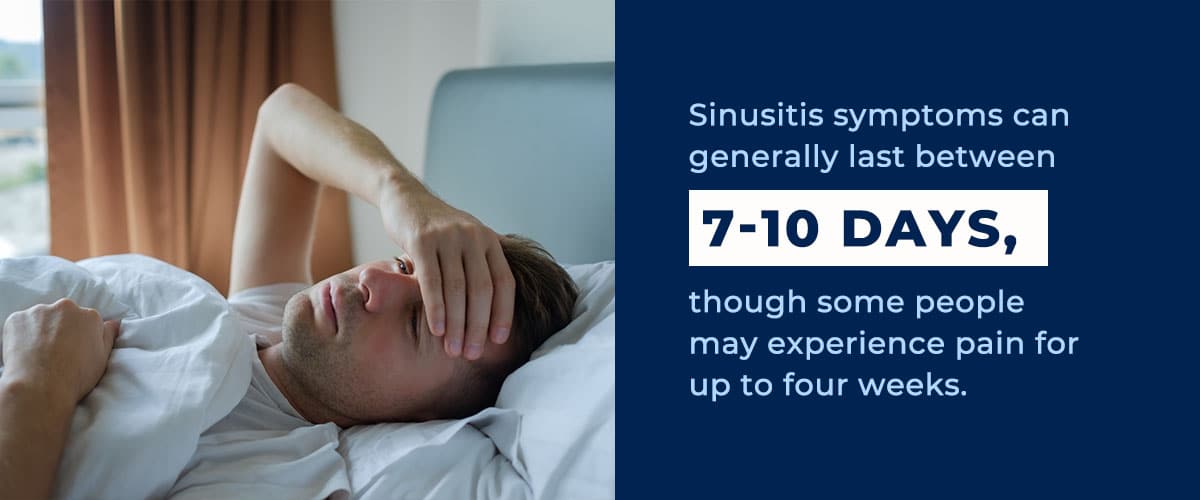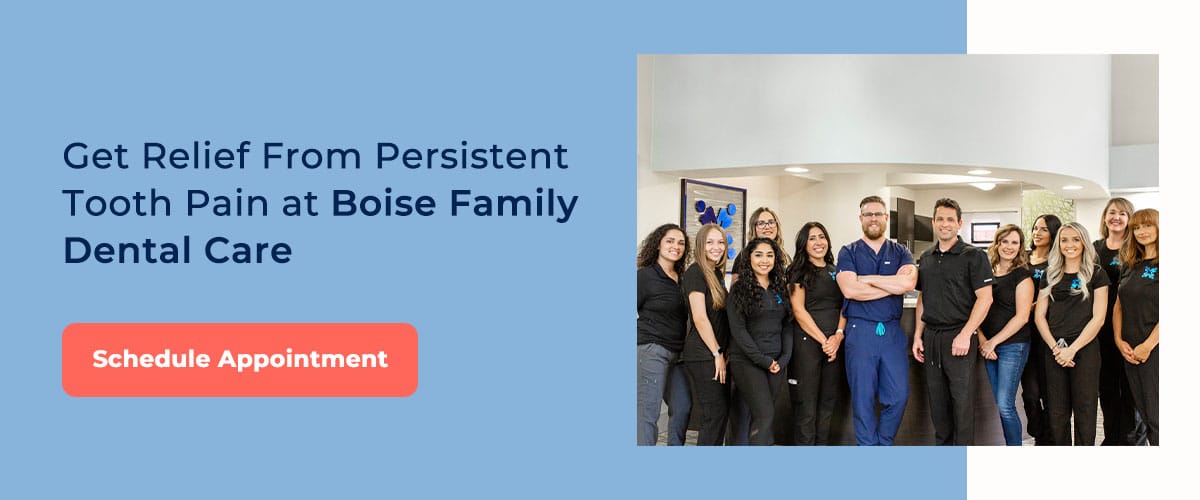Every year, millions of adults experience sinus pressure and infections that cause mild to extreme pain. A sinus infection can make your teeth hurt and cause aches in your jaw and gums. Sinus pressure occurs as a result of inflamed and swollen sinus cavities, putting pressure on your dental nerve endings and creating significant discomfort. In addition to a stuffy nose and headache, you’ll probably notice pain in your upper rear teeth under the nasal canal.
If your tooth pain is occurring as a result of a sinus infection, it may go away once the sinus issue is cleared up. However, tooth pain can still be distressing, especially if you’re unaware of this pressure as a side effect. If you’re experiencing sinus and tooth pain and don’t know what to do, we’ve compiled the top solutions to alleviate the discomfort and help you determine whether you need to seek professional dental help.
Can a Sinus Infection Cause Tooth Pain?
Yes. Tooth pain is one of the most common symptoms of a sinus infection, or sinusitis. Alternatively, a dental infection can cause a sinus infection. One study found that an estimated 40% of sinus infections originate from a dental infection.
It’s important to note that everyone’s dental anatomy is different, and a sinus infection may be the cause or the result of an underlying dental problem. If your sinus infection has not cleared up or your tooth pain becomes persistent or unbearable, it’s best to seek professional dental treatment.
It can sometimes be difficult to tell the difference between sinus tooth pain and other types of dental pain. If you feel a sharp, throbbing pain coming from one tooth, it’s likely a toothache. If you experience a constant ache that extends to other teeth, particularly those near your cheekbones, it could be a sinus infection. Other symptoms of sinusitis include:
- Fever
- Headache
- Nasal discharge
- Sore throat
- Postnasal drip
- Pressure-like pain behind the eyes
- Tenderness in the face
- Bad breath
How Long Does Sinus Pain in Teeth Last?

02 Sinusitis symptoms can generally last between
Sinusitis symptoms can generally last between seven to 10 days, though some people may experience pain for up to four weeks. If your sinus infection tooth pain has not resolved with over-the-counter medications after this period of time, it may indicate the need for treatment from a Boise dental provider.
10 Effective Home Remedies to Alleviate Tooth Pain from Sinus Pressure
Though it’s important to get a proper diagnosis to alleviate tooth pain caused by sinus pressure, here are some methods for pain relief you can try at home:
1. Eat Spicy Food
Ever heard someone tell you to eat spicy foods if you’re sick? Spicy foods tend to make your nose run, helping to drain the mucus in your sinuses and providing relief from sinus pressure. An ingredient found in many spicy foods known as capsaicin can help decrease inflammation and help you breathe easier. As a result, you may feel decreased sinus and tooth pain.
2. Change Your Head Position
The position of your head can make sinus pressure better or worse. A simple way to relieve sinus pressure is by tilting your head a different way to help free up the pathways blocked by mucus. Instead of lying down, keep your head and upper body tilted slightly forward to help the mucus drain. When you sleep, try to prop yourself up to alleviate the pain overnight.
3. Rinse With Saline
Flushing your sinuses with salt water can help reduce irritation in your mouth and throat. Saline can also help relieve pain caused by viruses and bacteria. Swish a saline solution in your mouth regularly or use a nasal irrigation system to flush your sinuses with a sterile solution to push out excess mucus.
4. Get Plenty of Rest
Sleep is an immune-supportive function that can promote your body’s defenses against inflammation and infection. Getting plenty of rest when you have sinusitis is crucial to helping you heal faster and clear up the pressure in your air pathway. Quality rest while keeping your head above your heart can provide sinus pain and congestion relief.
5. Take Over-the-Counter Medicine
Common expectorants and decongestants can make a big difference in relieving sinus pressure and draining mucus. Expectorants help thin and expel the mucus from your sinuses, while decongestants dry out the nasal canals. Both medications can provide fast relief from the pressure on your teeth.
Be sure to read the instructions on any medication before taking it. It’s essential to note that decongestants and expectorants will not address the root cause of your sinus or tooth infection.
6. Stay Hydrated
Drinking plenty of fluids is key to helping your body heal from any infection. Additionally, water helps keep mucus thin and loose, making it easier for you to cough up or expel from your nose. The more hydrated you are, the less mucus you’ll have blocking your sinuses. As a result, you may experience less tooth pain. You can also drink liquids that have the necessary electrolytes your body needs to encourage drainage.
7. Inhale Steam
Steam is a great way to release pressure by targeting the mucus buildup in your sinuses. In addition to hydration, using steam cause helps relieve pain by diluting mucus and clearing your air pathways. For a stronger decongestant, try using peppermint-infused steam or essential oil in a steamy shower to help drain your sinus cavities and relieve tooth pain.
8. Apply a Warm Compress
Applying warm compresses can help relieve sinus infection jaw pain. Lay a warm compress or cloth across your cheekbones and nose to help thin out trapped mucus and blocked sinuses. The warmth helps widen your blood vessels, reduce swelling and inflammation and increase blood flow to the area to accelerate your body’s healing abilities. Repeating this method can help your sinuses drain and reduce pressure, reducing your tooth pain.
9. Eat Anti-Inflammatory Foods
Spicy foods often have anti-inflammatory properties, but many other foods can also be helpful in reducing the symptoms of a toothache from a sinus infection. Some anti-inflammatory foods include:
- Spinach
- Kale
- Collards
- Olive oil
- Tomatoes
- Almonds
- Walnuts
- Strawberries
- Blueberries
- Cherries
- Oranges
- Salmon
- Tuna
10. Seek Dental Care
If this is your first time feeling tooth pain from sinus pressure, you’ll want to be sure that you don’t have an infection in your teeth. Because sinusitis can cause or be caused by dental issues, it’s critical to consult your dental care provider so they can perform an exam and determine where the issue originates. If there is a tooth infection, your provider will let you know how often you need to visit the dentist each year to prevent further issues.
Get Relief From Persistent Tooth Pain at Boise Family Dental Care
Tooth pain, whether or not caused by a sinus infection, can be extremely uncomfortable. If you’re unsure about the cause of your tooth pain, you can rely on professional guidance from Boise Family Dental Care. Our dedicated team will be able to help you determine whether sinus pressure and drainage are causing the aches and pains in your teeth or if a dental infection is present. Investing in your dental health with regular dental check-ups and cleanings can prevent dental infections in the future.
At Boise Family Dental Care, we understand how frustrating and bothersome tooth pain can be, which is why we help our patients address potential issues before they become more severe. It’s our goal to ensure you have a comfortable and stress-free visit. Schedule a consultation or check-up today to learn about the root cause of your tooth pain.




